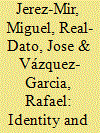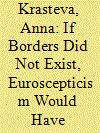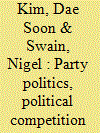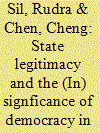| Srl | Item |
| 1 |
ID:
052167


|
|
|
| 2 |
ID:
089783


|
|
|
|
|
| Publication |
2009.
|
| Summary/Abstract |
European Union Integration and the process of political development and institution building are shaped by interactions between elites and masses. In their initial steps, scholars noted the Predominantly intergovernmental, elite-driven flavour of these processes (Inglehart 1970; Lindberg & Scheingold 1970). It has been during the last few years-as the process of European integration has deepened and the number of 'Europeanised' policy areas has expanded- that national arenas have also been increasingly concerned with European Union (EU) affairs,reinforcing the role of national elites and mass public opinion on European integration (Dalton & Eichenberg 1998).
|
|
|
|
|
|
|
|
|
|
|
|
|
|
|
|
| 3 |
ID:
172514


|
|
|
|
|
| Summary/Abstract |
The thesis of this article is that if borders did not exist, Euroscepticism would have invented them. If Sartre is paraphrased, it is to emphasize that Euroscepticism needs borders in the same intense political and symbolic way as anti-Semitism needs Jews. This thesis is argued in three steps. The first analyses the paradox of the intense theoretical deconstruction of borders in the era of an overbordered world and argues the ideas of the ‘revenge of the state’ and of the emergence of the ‘neo-post-Westphalian order’. The second part examines the post-communist Europeanisation as de-bordering and distinguishes three forms: Europeanisation through utopianization, Europeanisation through ethnic de-bordering and Europeanisation through de-territorialization. The third part analyses the interferences and intensification of re-bordering and Euroscepticism. The stato-national and the ethno-identitarian bordering practices are analysed through the images of wall and body. Two types of Euroscepticism – extremist and crypto – are distinguished and compared.
|
|
|
|
|
|
|
|
|
|
|
|
|
|
|
|
| 4 |
ID:
080947


|
|
|
|
|
| Publication |
2008.
|
| Summary/Abstract |
Using data for the period 1989 - 2002, we examine the determinants of income inequality in post-communist economies. We find a strong positive association between equality and tax collection but note that this relationship is significantly stronger under authoritarian regimes than under democracies. We also discover that countries introducing sustainable democratic institutions early are characterised by lower inequality. We also confirm that education fosters equality and find that larger countries are prone to higher levels of inequality
|
|
|
|
|
|
|
|
|
|
|
|
|
|
|
|
| 5 |
ID:
100145


|
|
|
|
|
| Publication |
2010.
|
| Summary/Abstract |
The aim of this article is to elaborate one aspect of post-socialist memory culture in one Baltic state, namely, which meaning is given to the late socialist period (1960–80) in Estonians’ personal narratives. Reminiscing about events of twentieth century has a meaningful place in the integration of the Baltic Sea region in the twenty-first century. The tensions between memory politics and personal experiences expressed in biographical accounts will also be explored. In the 1990s, late socialism was understood in Estonians’ cultural memory as part of a discontinuity discourse. In the early twenty-first century, the same period is understood more along the lines of a paradigm of everyday life.
|
|
|
|
|
|
|
|
|
|
|
|
|
|
|
|
| 6 |
ID:
102175


|
|
|
| 7 |
ID:
142109


|
|
|
|
|
| Summary/Abstract |
This article considers processes involved in coming to terms with the past in the early years of post-communist Hungary. It addresses the impacts of ‘soft’ late socialism, ‘negotiated’ post-socialist transition, and the intense inter-party and intra-party competition in which Hungary’s first democratically elected government operated. It concludes that claims that Hungary failed to confront the past in the early 1990s miss the mark. The past was confronted openly and aggressively by political actors, but the public will, as reflected in parliamentary legislation, was in favour of measures that resonated with ‘soft’ late socialism and a smooth post-socialist transition rather than political retribution.
|
|
|
|
|
|
|
|
|
|
|
|
|
|
|
|
| 8 |
ID:
064152


|
|
|
| 9 |
ID:
086238


|
|
|
|
|
| Publication |
2009.
|
| Summary/Abstract |
The state of democracy in post-communist Europe has been subject to some debate in recent years; but it needs to take account of longer-term trends. The focus here is on how far the EU's political conditionality has contributed to democratic consolidation using an in-depth case study of post-Soviet Latvia. The record of the impacts of conditionality up to EU entry is examined and then attention turns to whether post-accession tendencies have demonstrated any significant changes after the end of Brussels' monitoring. Using a comparative framework, this article shows that the outcome after four years of EU membership is mixed with both positive and negative results. It is concluded that there is no automatic locking-in effect of European integration; and that conditionality assists democratic consolidation more in structural than in attitudinal or behavioural terms.
|
|
|
|
|
|
|
|
|
|
|
|
|
|
|
|
| 10 |
ID:
052163


|
|
|